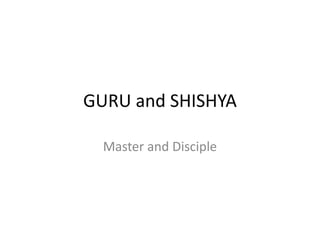
Guru and shishya
- 1. GURU and SHISHYA Master and Disciple
- 2. The Master (Guru) • the first to expound the theory of art in general terms, • His views have exerted a strong influence on every generation of thinkers. Any discussion on the general nature of literature must begin with him • Diverse and Contradictory views: on the one hand, he is opposed to arts as an end in itself and on the other, he glorifies and extols the artist and emphasizes his role in human life.
- 3. What did some English critics say about the Master (Guru) • “Of all philosophers, I have esteemed him most worthy of reverence and with great reason, since of all philosophers he is the most poetical”. - Sir Philip Sidney • He exhibits the rare union of close and subtle logic.......- Shelley
- 4. HIS REJECTION OF POETRY • Is it not surprising that the most poetic of philosophers is avowed enemy of poetry? • In Book-10 of his famous Republic, he banishes all the poets from his ideal state. • He exiles poets on two grounds: (1) Metaphysical (2) Ethical
- 6. He wrote, “This was the conclusion at which I was seeking to arrive when I said that painting or drawing and imitation in general are engaged upon productions which are removed from truth, and are also the companions and friends and associates of a principle within us which is equally removed from reason, and that they have no true or healthy aim.” Attainment of truth is a goal for human being All art, being fiction, is untrue and necessarily twists and distorts truth
- 7. His Doctrine of Ideas or Forms Ideal World Real World Imaginary/Artistic World
- 8. According to him, • There is an ideal world. The real world is reflection/copy/imitation of this ideal world, • Art is an imperfect reflection/imitation/copy of the real world, • Hence, art is an imitation of imitation, • It is third-hand distortion of the truth, • It is thrice removed from reality,
- 9. On ethical grounds, he rejects poetry because he believed that.... moral study :essential for all humans Wanted all arts to be governed by moral principles He as a right to oppose any artistic form A philosopher: moral custodian of the welfare of people
- 10. Rejection of poetry on ethical ground • He believed that imitative Art has a corrupting influence on man who should be governed by reason and not by passion • He condemns poetic imitation on the ground that it “fed and watered the passions instead of drying them up” • He advocates strict censorship and exhorts poets to inculcate in people moral virtues
- 11. The Shishya (Disciple) spent some twenty invaluable years under the tutelage of PLATO established the Lyceum in 335 B.C.: an academy- multidisciplinary, devoted to all available forms of knowledge including mathematics, philosophy, politics, sciences and arts On a modest estimate, his writings run to four hundred volumes In India, we know him as a teacher of Alexander, the great
- 12. The Disciple was an academic, a man of letters, a naturalist and in words of Eliot, “a perfect critic”. His works: acromatic Addresses many problems that PLATO addressed, makes full use of the terminology and doctrines of Plato to develop theories of his own In many cases, he shows his radical departure from Plato whose name is not even mentioned in his famous treatise, Poetics
- 13. How does he differ from his master? •Re-organise human life • believed that the phenomenal world- an objectification of the ideal world, the ideal world is real; the phenomenal world is but a shadow of this ideal world •Language: poetic and charming The Master (Transcendentalist, Idealist) •Re-organise human knowledge • believed in the reality of the world of the senses •This world is real and it must form the basis of any scientific and systematic inquiry •Language: dogmatic and telegraphic The Disciple (Scientist, biologist and an experimentalist)
- 14. Imitation (Mimesis) • Was first to use the word “imitation” in connection with poetry • Poet: just copies the ideal, he should be an instructor • Merely as a servile copy or mimicry of nature The Master • Took the word from his master and breathed a new life in it • Poet: a creator “Correctness in poetry is not the same thing as correctness in morals, nor yet is it the same as correctness in any other act” • Poet: the maker , his creations: imitations of human action, human character and human emotions • Art: free an voluntary activity, free from any utilitarian motives • A creative and dynamic process: while imitating the poet transforms the ideal into something new an much higher The Disciple
- 15. Imitation • Poetry- painting • Poetry: presents a copy of nature as it is • Poetry: a copy of reality • Poetry: what is • Philosophy- superior to poetry The Master • Poetry- music • Poetry may imitate men as they are or better and worse • Poetry: an idealised version of reality • Poetry: what ought to be • Poetry is as important as Philosophy The Disciple
- 16. The Teacher and the Student • Imitation: an imperfect copy • The poet imitates something as it is • Emotions: undesirable and advocated their repression (Phobia of emotions- Lucas) Teacher • Imitation leads us from particular to the universal, it is instructive • The poet not merely imitates but renews the things • Emotions: need for emotional outlets, medicinal, psychological, purgative use of emotions, emotions may be controlled and guided but not repressed Student
